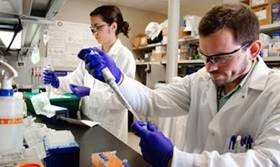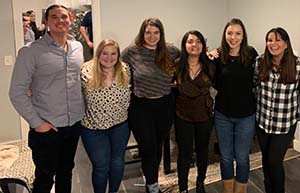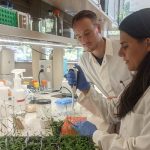UC Davis Professors Receive CIRM Award to Develop a New Gene Therapy Treatment for a Rare Neurodevelopmental Disorder
By Neelanjana Gautam
Over 43,000 people in California have an intellectual disability. CDKL5 Deficiency Disorder (CDD) is a form of neurodevelopmental disability, occurring in 1 of 40,000 live births in California, which amounts to 10 patients born every year.
Kyle Fink, an assistant professor in the Department of Neurology and Jill L Silverman, a professor in the Department of Psychiatry and Behavioral Sciences and the MIND Institute, have been awarded a two-year $1.4 million grant from the California Institute for Regenerative Medicine (CIRM) to develop a new method for treating CDD using CRISPR- mediated epigenetic editing.
The award is from CIRM’s DISC2 Quest program, which supports the discovery of promising new stem cell based and gene therapy technologies that could lead to broad development and therapeutic approval for disorders ranging from epilepsy, intellectual disability and autism, ultimately improving and changing the lives of affected individuals.
Developing a New Therapeutic Approach
CDKL5 (cyclin-dependent kinase-like 5) is a protein located on the X chromosome. CDD is a relatively rare developmental infantile epilepsy caused by changes in the CDKL5 gene. This X-linked dominant genetic condition is characterized by frequent seizures and moderate to severe neurodevelopmental disorders including lack of speech, impaired motor functions and stunted intellectual abilities in newborn babies. The condition predominantly affects females, as they have two X chromosome copies, resulting in a four times more common female prevalence, as compared to males (XY), who express a single copy of the X.
Random X chromosome inactivation occurs throughout cells in the female body, causing girls with CDD to have half the cells expressing the healthy copy of the gene and the other half expressing the variant copy.
“If you have an X-linked disorder, such as CDD, 50% of the cells will express the good copy and 50% will express the bad copy,” said Fink. Since all cells have a good copy of the gene, for Fink and colleagues, it presents an innovative avenue to turn it back on CDKL5 function.

Researchers Casiana Gonzalez and Julian Halmai working in the Fink Lab.
Julian Halmai, a graduate student and now a postdoctoral scholar, working in the Fink Lab, was the first to demonstrate that by using epigenetic editors, one can turn on a gene from the inactive X chromosome. “He was one of the first ever to show that this could actually be done in a cell,” said Fink. In 2020, Halmai published a paper titled Artificial escape from XCI by DNA methylation editing of the CDKL5 gene, in which he discusses how reactivation strategies hold great promise for individuals suffering from X-linked disorders. Halmai developed and spearheaded the epigenetic editing domains to show that they could be used beyond just cells in a dish.

Silverman Lab members.
Another member of the research team, Anna Adhikari, a postdoctoral fellow in the Silverman laboratory validated cognitive dysfunction in a rodent model of the disorder, while another postdoctoral fellow, Nycole Copping, recently uncovered an over-excited brain. These readouts will allow for testing the functional efficacy of therapeutics developed by Fink and Halmai.
“The collaborative efforts of the Program in Interventional Genetics, made up of Drs. Fink, Silverman, Segal and Ben-Shalom, are addressing a range of neurodevelopmental disorders, with intellectual disability, autism and co-occurring epilepsy. The CDKL5 is one of the few to continue to move forward with outstanding promise,” said Silverman. “The MIND Institute would like to move CDD research to a point of IND-enabling or trials. This is a game changing, exciting time in our laboratories and for the patient communities, as our teams aim to advance a curative therapy, for both the newly diagnosed and those living with the disorder for years.”
Key Partnerships to Support Gene Therapy Research
Fink’s research proposal was submitted through the Gene Therapy Center, one of the IMPACT Centers within the Office of Research. “Dr. Jan Nolta, director of the center, played a key role in the background, helping us to establish important partnerships. We have been supported and guided by the center and leveraged all its expertise to advance our research,” said Fink.
Loulou Foundation, a nonprofit dedicated to the research and development therapeutics for CDD has played a significant role in Fink’s research for several years. “We’ve been funded by the Loulou Foundation continuously for a little over four years now to lay the foundation of targeted epigenetic editing as a therapeutic approach,” said Fink. “They have been a key player in our research beginning in 2017. This project was made possible by one of their pilot awards, and the partnership helped us leverage the investment to get these larger awards for translational work.”
“We are delighted to learn of the CIRM award to Dr. Fink and his team to enable the continuation of their groundbreaking work on X reactivation of the CDKL5 gene as a therapeutic approach to the treatment of CDKL5 Deficiency Disorder,” said Daniel Lavery, chief scientific officer of the Loulou Foundation and director of the CDKL5 Program of Excellence in the Orphan Disease Center at the Perelman School of Medicine, University of Pennsylvania. “The announcement of such a significant investment by CIRM validates the support provided to Dr. Fink’s lab by the Loulou Foundation and the Orphan Disease Center over the past five years, as well as our confidence that Dr. Fink and his team would be able to advance this promising, yet challenging, therapeutic approach. We look forward to even greater success in these efforts to bring meaningful therapies to families living with this devastating disorder.”
The researchers hope that developing a new method for treating CDKL5 will have a transformative impact on females affected by the disease. In addition, it could provide a platform for the approximately 38 other X-linked intellectual disabilities that predominantly affect females.
Media Contact
AJ Cheline, UC Davis Office of Research, 530-752-1101, [email protected]
Latest News & Events







